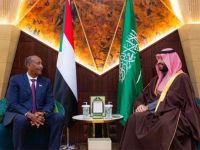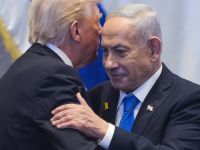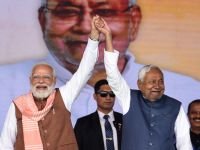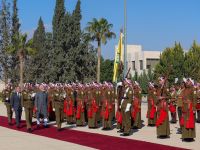Background of bilateral relations between Iran and Oman
The history of Iran-Oman relations date back to hundreds of years ago. After Sultan Qaboos bin Said came to power in 1970, Iran was the third country that recognized him, helping Oman's internal security by countering the Dhofar uprising. In fact, after 50 years of diplomatic relations, Iran and Oman have maintained their relations, even at the height of regional polarizations.
Opportunities in bilateral relations between Iran and Oman
Expanding diplomatic and neighborhood relations: Oman is located between Iran, the UAE, Saudi Arabia and Yemen. Oman and Iran are neighbours , having a water border and Oman’s Musandam Peninsula is located in the southern part of the Strait of Hormuz. The strategic Strait of Hormuz is located between Iran and Oman.
#Iran President arrives in Oman for official visit https://t.co/a2hWK2FDJS
— Middle East Monitor (@MiddleEastMnt) May 24, 2022
From the beginning of its activity, the new government of the Islamic Republic of Iran has put the focus of its foreign policy and diplomatic movements on the initiative of 'neighborhood policy', giving priority to 'regional policy' and 'Asia-oriented foreign policy'. Therefore, the expansion of diplomatic relations and neighborly relations with neighbors is a priority in the foreign policy of the Iranian government.
In terms of Oman's foreign policy principles, Iran is one of the most important neighbors. On the other hand, based on the principle of a good neighbor, Muscat is also trying to maintain good relations with its neighbors, helping them to maintain good relations with each other, facilitating consultation, and to have a pragmatic approach instead of temporary ideological positions on Iran.
Bilateral security and political cooperation: At the end of the recent one-day visit of Iranian President Ebrahim Raisi to Muscat, Iran and Oman in a joint statement, emphasized on the redoubled efforts to ensure security and stability in the region and the world, coordination and consultation between the two countries in various regional and international forums on the importance of combating all kinds of terrorism and extremism.
Oman's foreign policy also seeks a security structure that takes into account the long-term and common interests of all countries economically and strategically in the region. In this context, Oman and Iran take into the consideration the maintenance and continuation of military relations and security cooperation, joint military exercises, the Military Friendship Committee, and the visits of high-ranking military delegations.
Iran's President Ebrahim Raisi arrived in Oman on Monday with trade deals on the agenda and as international talks on Tehran's nuclear programme hang in the balancehttps://t.co/nevLtzaBWU
— AFP News Agency (@AFP) May 23, 2022
The mutual supervision and interests of the two countries on the Strait of Hormuz as the most important shipping route, transportation, and energy transfer in the world, and its protection against conflict can also play a decisive role in strengthening and expanding security and defense relations between the two countries.
Regional cooperation and reduction of regional tensions:
During five decades, Sultan Qaboos turned Oman into a notable player in the Middle East. Following the death of Sultan Qaboos in January 2020, Haitham bin Tariq al-Saeed, as the new Sultan of Oman, emphasized the continuation of the country's past and Sultan Qaboos's foreign policy based on peaceful coexistence between nations and good neighborliness following Qaboos's foreign policy. In fact, Oman does not consider Iran's nuclear program a threat to regional security.
In this regard, as in the past, Oman's role in the release of Iranian money, secret negotiations and the facilitation of diplomacy between the United States and Iran and the Vienna talks have been important. Oman can still play an important role in returning to the Joint Comprehensive Plan of Action (JCPOA).
Oman is a valuable regional player with a lot of influence, so, maintaining the independence of Oman's foreign policy is in the interest of the United States, as well as the strategic interests of Iran. In the eyes of many in Iran, Oman has sought to play a positive role , reducing divisions, paving the way for peace, and friendship without classification, conflict and polarization. Therefore, Tehran considers Oman's moderate policy useful.
In fact, Oman remains a close ally of the United States, and Oman's long-standing partnership with the United States is critical to reciprocal goals, including promoting regional stability, and combating terrorism. On the other hand, it has continued its relations with Iran and is trying to reduce bilateral tensions by mediating between Iran and the United States on past challenges, such as the Iran-US nuclear talks.
Muscat is also trying to bring Saudi-Iranian views closer, while mediating for the settlement of Yemen. Oman seems willing to expand its role in helping Yemen with Iran's support. This approach can have positive consequences for Oman in the regional dimension and the establishment of peace and stability in crises such as Yemen.
In addition, one of the key pillars of Oman's foreign policy has been to strike a balance with its Arab neighbors and Western allies on the one hand, and Iran on the other. However, Oman is a member of the Arab League and the Cooperation Council. But as Muscat refused to join the Saudi-led military intervention in Yemen, it avoided sanctions against Qatar. Cooperation with Iran will also enable Muscat to maintain the opportunity for independence and the possibility of independent maneuvering against the UAE and Saudi Arabia, or to use Iran as a factor to strike a balance with other actors.
Win-win economic and commercial interests:
Earlier, Iranian Foreign Minister Hossein Amir-Abdollahian explicitly mentioned the 40 percent share of economic diplomacy in the Foreign Ministry's programs. In the past year, events such as the visit of Oman Foreign Minister Badr bin Hamad al-Busaidi to Tehran, the establishment of a joint strategic consultative committee, visa facilitation for Iranian and Omani nationals, and the expansion of private sector cooperation have increased the scope of Iran-Oman economic relations.
Annual trade between Iran and Oman grew by 53% to a record $ 1.3 billion. Recently, eight memoranda of understanding and four cooperation agreements in sectors such as energy, transportation, economic and trade relations, and further emphasis on the positive role of the private sector, the opening of various channels for new economic participation can add to the scope of economic relations.
Oman is a small country in the region, but it has plans to improve the country's economic situation in the 2040 perspective. Oman's vision for development is based on a commitment to the outside world, interaction with the world, communication and trade. Therefore, having new and expanding ports, Oman is seeking an international transportation center and to find a prominent role in regional and international trade in the coming decades.
In this regard, if the North-South Corridor is activated, the implementation of the Iran-Oman, Turkmenistan-Uzbekistan Quartet Agreement, the activation of maritime agreements, the connection of ports and the strengthening of air traffic can play a more important role in the region's economy and multilateral cooperation.
Development of energy-based collaborations: Although, in 2013, the two countries signed a $60 billion contract for 25 years to transport Iranian gas to Oman's Musandam province, but after that, the implementation of project was delayed due to price differences, US pressure on Oman, US withdrawal from the 2015 nuclear deal, anti-Iranian sanctions, planned diversion of the pipeline, and so on.
Efforts to rehabilitate the pipeline have intensified in recent months, and an agreement to revive the gas pipeline project could have far-reaching benefits for Iran and Oman. If the two countries revive the gas pipeline project, Europe will find an alternative source of gas and generate new revenues for Oman. In addition, the recent agreement between Iran and Oman on the integrated development of the Hengam field (between Iran and Oman) could help increase the two countries' oil and gas production and cooperation in the framework of OPEC and OPEC Plus.
Challenges and prospects
Oman and Iran have many common cultural and religious roots, and improving the level of relations in the field of tourism, especially health tourism, can strengthen mutual interests. But despite the various potentials, cultural relations and tourism are not very extensive. The Sultan of Oman welcomes the forthcoming visit to Iran, although it can increase Iran-Oman relations to strategic levels, but the current level of economic relations and the very low share of each in exports to the other side is not desirable.
In fact, the economic potential between the two countries is high, but there are many obstacles in the way of economic relations, full implementation of past agreements and even increasing the value of trade to $5 billion. Nevertheless, despite various regional and international challenges, the prospects for the development of political, diplomatic and even strategic partnership between the two countries are still clear.







